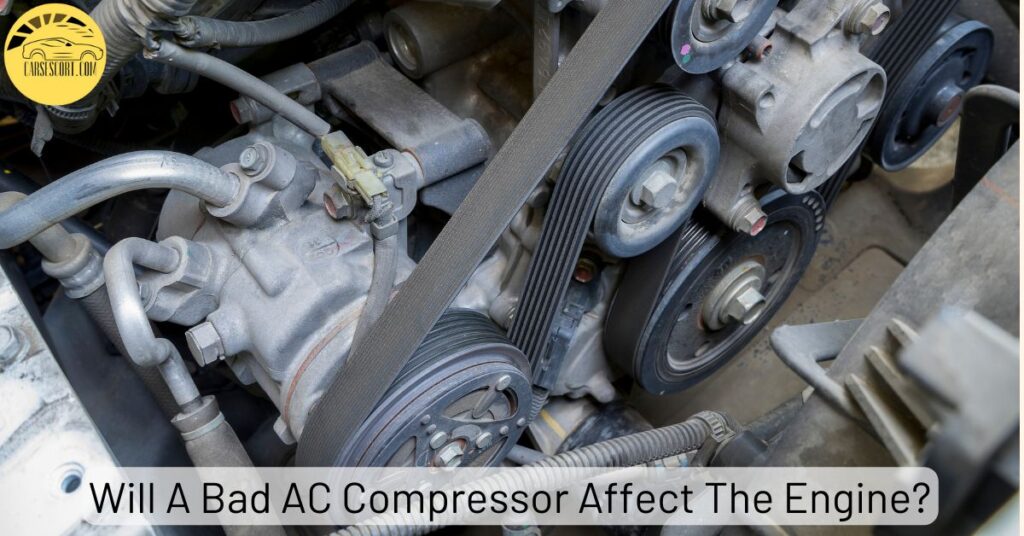Yes, a bad AC compressor has several adverse effects on the engine. One potential consequence is if the AC pulley seizes up, the serpentine belt that drives it may start to rub against it until it eventually breaks. A broken compressor can damage other auxiliary systems and cause an immediate engine shutdown.
Proper car maintenance is crucial for ensuring optimal performance and, most importantly, your safety. A malfunctioning AC compressor can harm the engine and your overall driving experience, particularly during long journeys in hot summer conditions.
This blog post is an ultimate guide about AC compressors and their effect on the vehicle engine.
Keep Reading!!
What Is a Bad AC Compressor?
A bad AC compressor refers to a compressor that is not functioning properly or has become faulty. It could exhibit issues such as poor cooling performance, unusual noises, leaking refrigerant, or failing to engage when the AC system is turned on.
A faulty AC compressor can significantly impact the overall functionality of the car’s air conditioning and engine performance.
Will A Bad AC Compressor Affect The Engine?
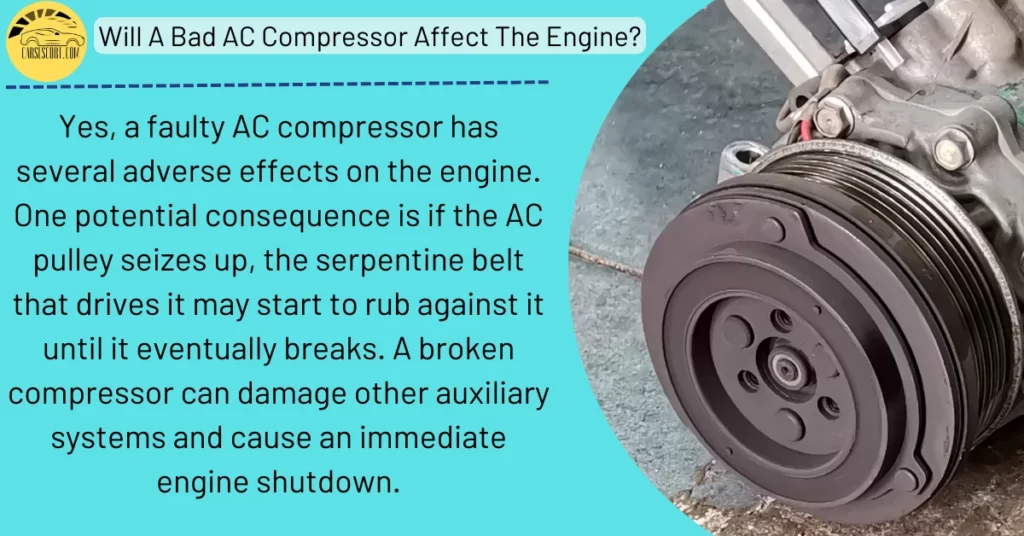
When the car AC compressor is seized or not functioning correctly, it can put extra strain on the engine when it tries to power the compressor. This can cause the engine to work harder and overheat or fail prematurely.
A bad compressor can lead to a refrigerant leak, which can affect the overall performance of the AC system and cause the engine to work harder to compensate for the loss of refrigerant, leading to overheating and damage to the engine.
Some cars have a serpentine belt that connects the AC compressor to the engine. If the compressor seizes or the belt breaks, it can cause the engine to stall or even fail to start.
Faulty AC Compressor Symptoms
- Insufficient cooling: The air conditioning system fails to produce cold air or blows warm air.
- Unusual noises: When operating, the AC compressor may produce grinding, squealing, rattling or loud noises.
- AC system cycling frequently: The compressor may engage and disengage more frequently than usual, resulting in uneven cooling.
- Leaking Refrigerant: If you notice refrigerant leaking from the compressor, it indicates a problem.
- Excessive vibration: A faulty compressor can cause the car to vibrate excessively, especially when the AC is turned on.
- AC system fails to turn on: The compressor may fail to engage or activate, preventing the air conditioning from functioning.
- Burning smell: A burning odor from the AC can indicate ac compressor failure.
- High-Temperature Levels: A malfunctioning air compressor can put additional strain on the engine, leading to higher operating temperatures.
- Elevated engine RPM: The engine may rev higher than usual when the AC is turned on due to compressor issues.
- Tripped circuit breaker or blown a fuse: A faulty compressor can blow a fuse or tripped circuit breaker.
Can A Bad AC Compressor Cause A Car To Stall?
No, a bad AC compressor alone typically would not cause a car to stall. However, there are scenarios where a failing AC compressor can indirectly affect the car’s engine, potentially leading to stalling. One such scenario involves a seized AC compressor, where the compressor pulley locks up and prevents the drive belt from turning smoothly.
This excessive load on the engine can cause a drop in RPM (revolutions per minute), potentially affecting the engine’s performance and leading to stalling in extreme cases.
While a faulty vehicle AC compressor can affect the operation of the air conditioning system and cause issues such as loss of cooling or strange noises, it is not directly related to the engine’s performance or ability to run.
It’s important to note that there could be various other reasons for a car to stall, such as fuel system problems, ignition issues, sensor malfunctions, or mechanical failures in the engine itself.
If you’re experiencing stalling or any other issues with your car, it’s recommended to have a qualified mechanic diagnose and repair the problem.
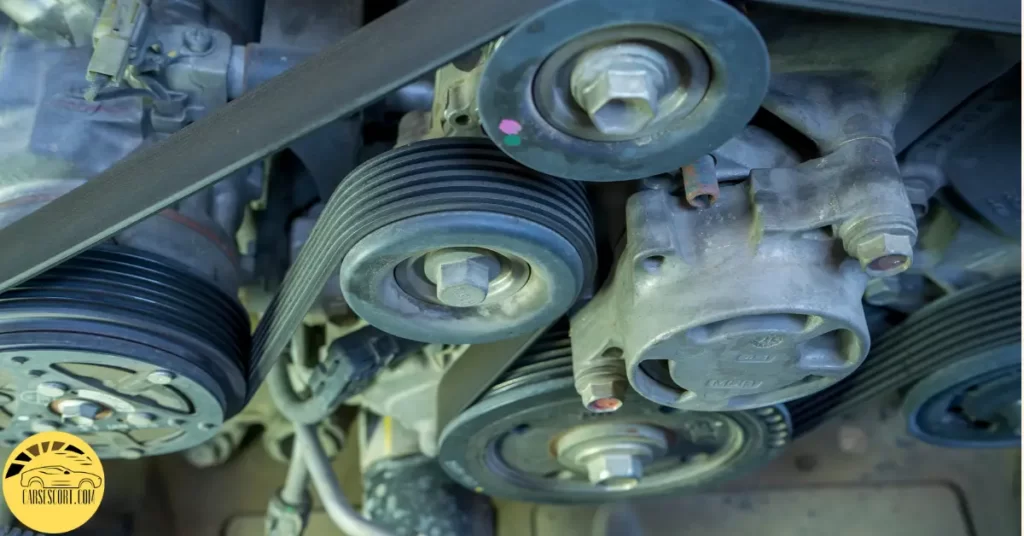
Can A Bad AC Compressor Cause A Check Engine Light?
Some modern vehicles are equipped with systems that monitor various components, including the AC system. If the vehicle’s onboard diagnostics detect a fault or abnormality in the AC compressor or related components. In that case, it may trigger a diagnostic trouble code (DTC) and illuminate the check engine light.
A lousy AC compressor alone typically would not cause the check engine light to come on. The check engine light is primarily designed to indicate issues related to the engine’s performance or emissions system.
A faulty AC compressor can indirectly trigger the check engine light. For example, suppose the AC compressor is seized or experiences a significant mechanical failure. In that case, it can place an excessive load on the engine, leading to a change in engine parameters or sensor readings.
This change in engine behavior or abnormal sensor readings may trigger a fault code in the engine control unit (ECU), which can then illuminate the check engine light.
Can A Bad AC Compressor Cause A Rough Idle?
Yes, a bad AC (air conditioning) compressor can cause a rough idle in a vehicle. The AC compressor is connected to the engine through a belt, and if it malfunctions or becomes damaged, it can place additional strain on the engine, affecting its performance at idle.
When the AC compressor is engaged, it places an extra load on the engine, requiring more power to operate. If the compressor is faulty, it may seize up, create excessive friction, or cause the engine to work harder than necessary.
This additional strain can disrupt the engine’s smooth operation at idle, leading to a rough or uneven idle.
Read More From Our Cars Care Guide:
- Can You Use Lacquer Thinner In Gas Tank?
- What Happens If You Don’t Relearn Crankshaft Position Sensor?
Diagnosing A Bad AC Compressor In Your Car
Diagnosing a malfunctioning AC compressor in your car involves several steps. Here’s a guide to help you identify potential issues:
1) No Cold Air
If your car’s AC system is blowing hot air or isn’t cooling as it should, the compressor could be the culprit.
However, it’s essential to rule out other common issues like low refrigerant levels or a faulty blower motor before concluding that the compressor is at fault.
2) Strange Noises
Pay attention to any unusual noises from the engine compartment when you turn on the AC. A lousy compressor may produce grinding, squealing, or rattling sounds. These noises indicate potential internal damage or worn-out components.
3) AC Clutch Engagement
When you activate the AC, the clutch on the front of the compressor should engage and start spinning. If the clutch fails to engage, it could indicate a problem with the compressor.
A visual inspection can help determine if the clutch is receiving power and the compressor is receiving the proper signals.
4) Leaking Refrigerant
Check for any signs of refrigerant leaks around the compressor. Look for oily residue or stains on or around the compressor, fittings, or hoses.
A leaking compressor can lead to insufficient cooling or complete AC system failure.
5) Compressor Clutch Failure
Inspect the clutch visually. If the clutch shows signs of damage or wear, such as cracks, excessive wear, or a burned appearance, it may indicate a failing compressor.
6) High-Pressure Readings
Connect a pressure gauge to the high-pressure side of the AC and observe the readings.
If the pressure is excessively high or constantly fluctuating, it could indicate a failing compressor.
7) Professional Inspection
If you’re unsure about diagnosing the AC compressor yourself or if you’ve identified potential issues, it’s recommended to take your car to a qualified mechanic.
They have the necessary tools and expertise to diagnose thoroughly and accurately determine if the air conditioning compressor needs to be replaced.
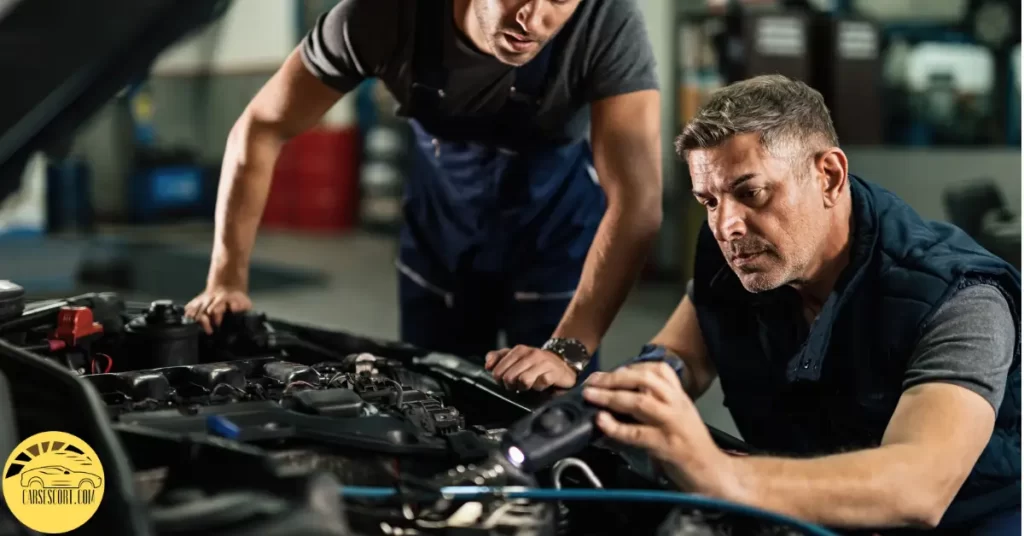
AC Compressor Replacement Cost
The cost of replacing an AC compressor in a car can vary depending on several factors, such as the make and model of the vehicle, the location of the repair shop, and whether you choose a new or remanufactured compressor. On average, an AC compressor replacement can range from $500 to $1,500 or more.
Can you drive with a bad ac compressor pully?
No, you cannot drive with a bad AC compressor pulley. If the AC compressor pulley is flawed or damaged, it can lead to various problems that can affect both the AC and the overall performance of your vehicle
The AC compressor pulley plays a crucial role in the proper functioning of the AC system in your vehicle. The compressor pully transfers power from the engine to the compressor, pressuring the refrigerant and allowing the AC system to produce cold air.
How Driving With A Bad Compressor Affects The Engine?
1) Belt Slippage
A bad pulley may cause the serpentine belt to slip or come off. This can result in the loss of power to other essential components like the alternator, power steering pump, or water pump, leading to potential engine damage or loss of control over the vehicle.
2) Overheating
The AC compressor pulley is connected to the engine’s cooling system. If the pulley is faulty, it can cause excessive heat buildup in the engine, leading to overheating and potential engine damage.
3) AC System Failure
The bad pulley can cause excessive strain on the air conditioning compressor, leading to premature wear and potential failure. This will result in a complete loss of cooling and dehumidification capability, making it impossible to cool the vehicle’s interior.
4) Increased Fuel Consumption
When the AC compressor pulley is not functioning correctly, it can put additional strain on the engine, causing it to work harder than necessary.
This can increase fuel consumption, negatively impacting your vehicle’s fuel efficiency.
Why Compressor Clutch is not Working Correctly?
1) Faulty Compressor Clutch Coil
The electromagnetic coil that engages the clutch may be defective or worn out, preventing the clutch from moving.
2) Broken Compressor’s Bearing
If the compressor’s bearing is damaged or worn out, it can restrict the movement of the clutch assembly.
3) Poor Compressor Engagement
The compressor clutch may not fully engage due to low refrigerant levels, a faulty pressure switch, or a malfunctioning control module.
4) Broken Serpentine Belt
A broken or slipping serpentine belt can prevent the compressor clutch from receiving power and engaging properly.
5) Faulty Clutch Relay
A defective clutch relay can interrupt the power supply to the clutch, causing it not to move.
6) Electrical Issues
Wiring problems, such as damaged or disconnected wires, can disrupt the circuit and prevent the clutch from functioning correctly.
7) Failed Compressor Clutch Assembly
Over time, the clutch assembly can wear out or become damaged, resulting in improper operation.
8) Malfunctioning Control Module
The control module responsible for regulating the clutch may malfunction, leading to inconsistent or no engagement.
9) Insufficient Refrigerant Pressure
Low refrigerant pressure can prevent the compressor clutch from engaging since it has a safety mechanism to prevent damage when refrigerant levels are insufficient.
10) Defective Clutch Pulley
The clutch pulley, which supports the compressor’s rotating assembly, can fail, causing the clutch not to move.
11) Seized Compressor
If the compressor is seized or locked up, it can prevent the clutch from operating correctly.
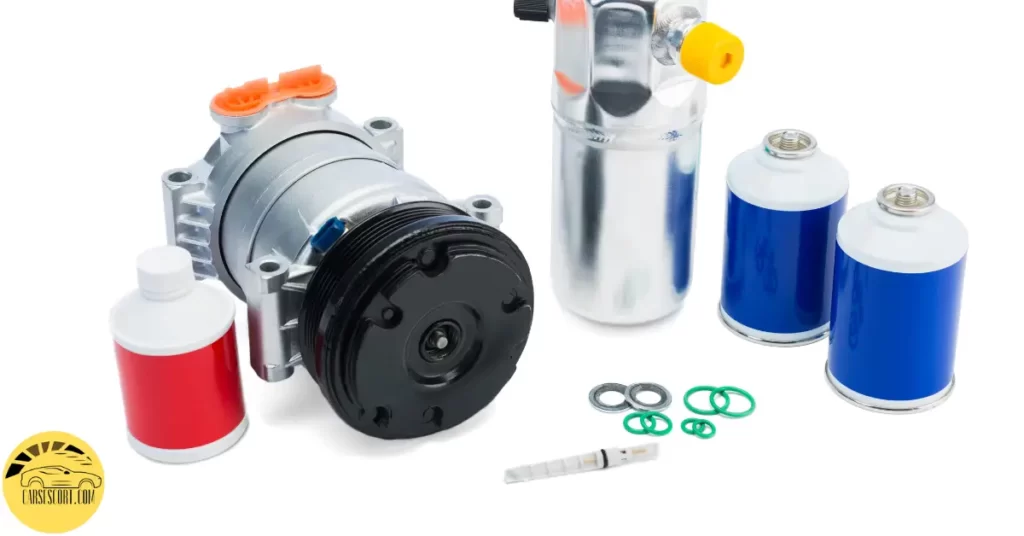
FAQ
How do I know if the AC compressor starts or doesn’t work at all?
To know if the AC compressor is working, you can observe whether the AC clutch engages and the compressor starts spinning when the AC is turned on. No engagement or spinning may indicate a problem with the compressor.
Does a bad AC compressor make noise?
A bad AC compressor can make noise, such as grinding, squealing, or rattling sounds. Unusual noises may indicate internal damage or worn-out components within the compressor.
Can an ac compressor that goes bad affect the whole air conditioning system?
Yes, a bad AC compressor can affect the entire air conditioning system. If the compressor fails, it can impact the overall cooling performance and functionality of the AC system.
Does the ac compressor affect the alternator?
The AC compressor and the alternator are separate components but rely on the engine’s belt system. A seized or failing AC compressor can place an additional load on the belt, which may affect the alternator’s performance.
Can the car be driven without an AC compressor?
It is possible to drive a car without an AC compressor; however, it will lose air conditioning functionality.
The compressor can be bypassed or removed, but it’s recommended to have the system properly diagnosed and repaired to restore full functionality.
Can a bad AC compressor cause an engine to not start?
No, a bad AC compressor should not cause the engine not to start. The AC compressor operates independently of the engine starting process.
However, if the AC compressor is locked up or seized, it can place an additional load on the engine when the AC is engaged, potentially affecting its performance.
Will a bad ac compressor affect the battery?
A bad AC compressor can indirectly affect the battery. If the compressor clutch remains engaged or has an electrical issue within the compressor, it can draw excessive power from the battery, causing it to drain more quickly.
This can lead to a weakened or dead battery over time. It’s essential to promptly address AC compressor issues to prevent unnecessary battery strain.
My Final Thoughts
Will a bad AC compressor affect the engine? A faulty AC compressor can have detrimental effects on the engine. The strain it puts on the engine can lead to overheating, premature failure, and even engine stalling or failure to start.
Refrigerant leaks caused by a lousy compressor can further impact the engine’s performance and increase the risk of overheating.
To ensure the health and longevity of your vehicle, it’s crucial to seek the expertise of a qualified mechanic who can diagnose and repair any AC compressor issues promptly.
Taking proactive measures will help maintain a smoothly running engine and a reliable AC system.
For more related queries, please write to us in the comment section.
Thanks For Reading!!!
Affiliate Disclosure: Cars Escort is a participant in the Amazon Services LLC Associates Program. As an Amazon Associate, we earn from qualifying purchases made through affiliate links on our site. Read Our Disclaimer .

